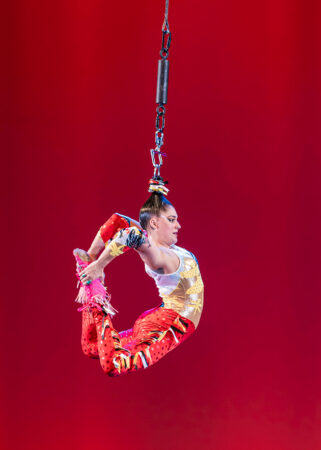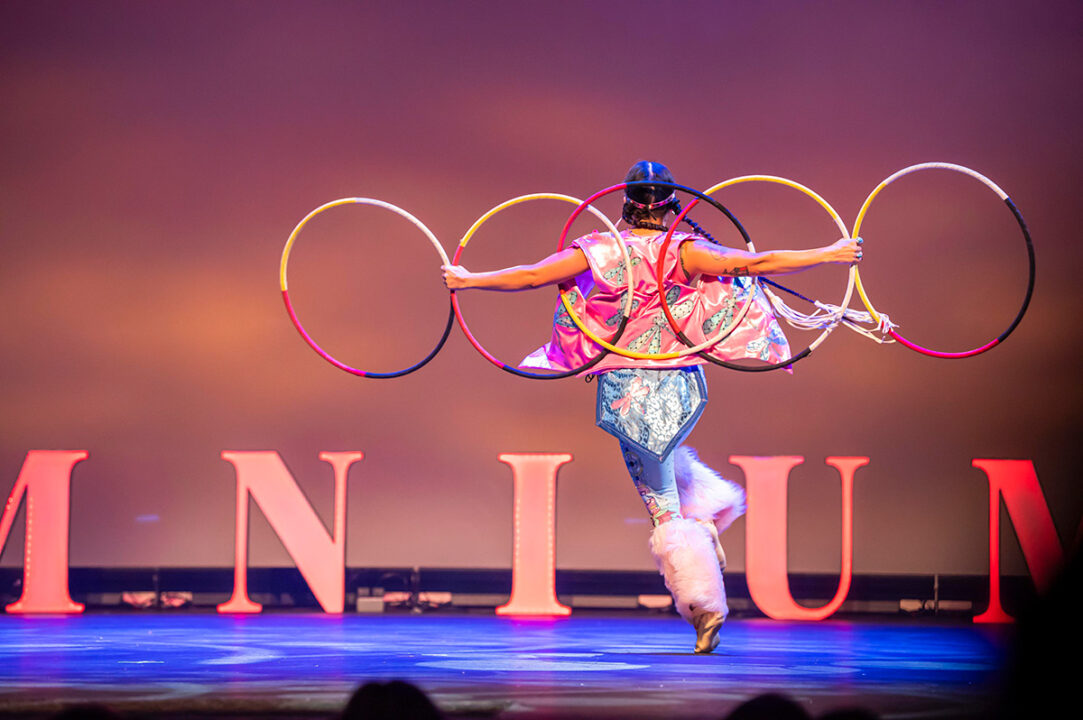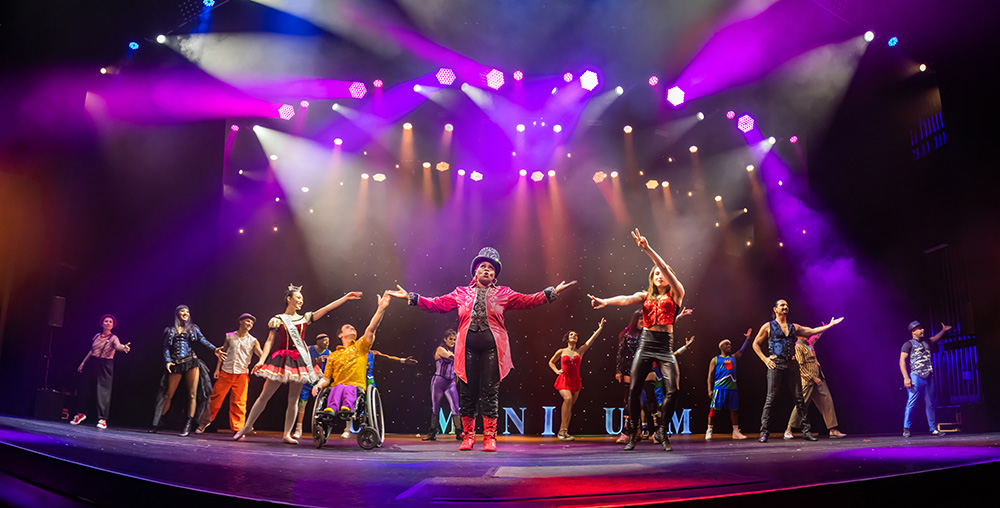When Omnium Circus says all are welcome, they really mean it. With performers with visible and invisible disabilities, a majority BIPOC cast, integrated American Sign Language (ASL) and calming spaces for those who get overstimulated, there is a place for everyone who wants to come to witness the fantastic feats of the Circus.
“Omnium is a really, really special group,” says performer, Dr. Stephanie Morphet (Shawnee, she/they). “In other groups that I’ve worked with that care about representation, I would be the only person of color on the cast, but Omnium really goes above and beyond when it comes to diversity and inclusion.”
Known as the Flying Brain, Dr. Morphet is not the sort you would expect to see at a circus. From a high school dropout to a Ph.D. in Molecular Biology, Dr. Morphet now holds the world record for the most amount of weight held only by a person’s hair.

“Everyone thought I was joking when I said I would hang from my hair for a living,” laughs Dr. Morphet. This may shock people, but for Dr. Morphet it was fate.
“I’ve had long hair my entire life that I’ve never bleached or dyed,” says Dr. Morphet. “To Indigenous people, hair is the physical manifestation of our spirit and our wisdom. I’ve always taken great care of my hair.”
Hair hanging, however, is a closely kept secret in the Circus world. But when Dr. Morphet saw Danila Bim performing while suspended by only her hair at Cirque Du Soliel Volta, she knew what she was meant to do.
“For a couple hundred years, there was a systemic deculturization of Indigenous peoples,” says Dr. Morphet. “The government would take little kids off and ship them to boarding schools. Their hair would be cut. Their names would be changed. Their clothes would be changed. They would be beaten if they spoke their native language, and that’s what happened to my relatives.”
“For me, to not only grow my hair long, but to do these incredible feats with the strength of my hair and share my culture with things I can do with my hair, it’s serendipitous. It feels like what I should be doing. Knowing that my relatives were stripped of their hair, but that I now can create art with it that people from every demographic want to watch and find beauty in, that’s just incredible to me.”
Indeed, what Dr. Morphet shares as a performer is not just her incredible feats while suspended only by her hair, it’s also her culture.
“The style of hooping that I originally learned is circus hooping. I was always a little intimidated to do cultural hooping, even though it was something I wanted to do. I didn’t want to be the quarter-blood that didn’t do it right.”
Also known as Native American Hoop Dance, cultural hooping is a sacred tradition where a dancer makes poses with both their body and their hoops to make different shapes that represent the story of life.
Though Dr. Morphet was hesitant, Lisa B Lewis, the founder and executive director of Omnium Circus, encouraged her to try it. After training for three months, Dr. Morphet said that performing it on the stage for the first time was a profound moment for her.

“Any time I get to share culture is really meaningful for me. Not only to know that I’m part of representing my people but to share my culture with those who have never interfaced with Indigenous culture. It’s just really special.”
When asked if her family is proud of what she does, Dr. Morphet pauses. “They are now,” she says, but it took some time. “They were like, ‘you have a doctorate, what are you doing?!’ But when they saw me perform for the first time, suddenly the light went on and they understood.”
“I had to fight for everything,” Dr. Morphet says, “When I was pursuing science, I was told not to use an Indigenous name, told how I should dress, how I should talk, and how I should do my hair. That was the environment I was used to—to just be tolerated. But then at the Circus, I was not only accepted for who I am, but celebrated for who I am.”
“If I could wish something for every person, it would be that. There’s no better feeling in the world than to be celebrated for who you are as an individual, for your culture, your passions, and the things that make you different.”
And if there was ever a circus that fully embodies this beautiful sentiment, it’s Omnium Circus.
“Omnium has the most diverse cast that I have ever been on—not just thinking about racial diversity. We have folks in wheelchairs, a majority BIPOC cast and a dancer poet that signs throughout the show,” says Dr. Morphet. Better yet, it’s not just ASL interpretation. It’s an integral part of the show.
“Omnium is the first time I’ve been a part of a show that made that much effort to be inclusive and have representation of so many different demographics.”
That is one of the things that makes Omnium Circus stand out. When they say inclusivity, they mean inclusivity.
“Yes!” exclaims Morphet. “At like every level too! Not just performing members, but stage crew and board members. They are focused on inclusion at every level in the organization.”
Some circuses would try to be inclusive—they might have a day for ASL interpreters, have accommodations for autism, or narrations for the blind on different days. If you had multiple disabilities in a family, you couldn’t enjoy the show together. That was one thing that Omnium Circus set out to change.
But that’s how it should be. “For hundreds of years Circus has been a place to run to for people who didn’t fit into society so they could value in themselves for who they are and what they can do,” says Dr. Morphet. “I just think Circus is pure magic and has something for everyone.”
Often the message in society is that “you can do anything if you just try” but we all have limitations. There are some acts people just cannot do and never will be able to do like Iron Jaw hanging. If you don’t have the teeth and gum health, no amount of training will get you there. But that doesn’t matter. In you is another talent that is uniquely yours that you can explore and stretch into your own personal art form.
“If you want to be a ballerina but you can’t dance en pointe, it doesn’t matter about anything else you do well,” says Dr. Morphet. “But in Circus, you don’t have to do everything. You don’t have to be the skinniest, fastest or strongest spinner—you can find what’s special to you and run with it. That’s why it’s such a special art form.”
Circus, especially Omnium Circus, is not only a jaw-dropping performance that will leave you in awe of the incredible achievements that people can achieve—it also relays a message of body positivity, self-acceptance and love.
“It gives kids a reason to appreciate their bodies for what their bodies can do. It’s really empowering, instead of focusing on thoughts like ‘Well, how do I look?’” says Dr. Morphet. “Even if you feel different or alone, or people don’t understand you, there are communities that are inclusive and will embrace you for who you are. Truly there is a place for everyone in this world no matter how alienated you might feel in this moment.”
Circus has traditionally been housed in a big tent and this one is large enough to welcome all. The Lincoln Center is proud to present Omnium Circus and the depth and richness this inclusive troupe brings to our community. Come join us on March 14, 2024 at 7:30 p.m. to experience the wonder and the excitement of Omnium Circus. Seats start from $15 at LCtix.com.
